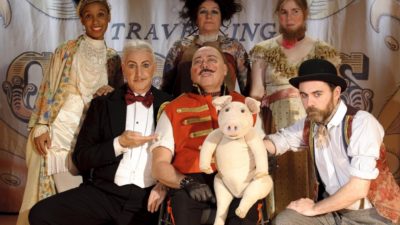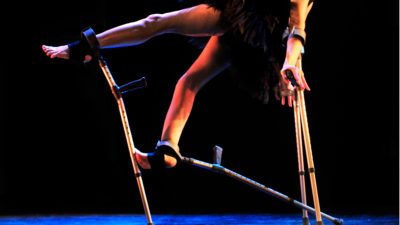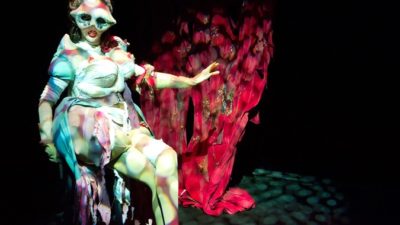Garry Robson (Fittings Multimedia Arts), Maria Oshodi (Extant), Stine Nilsen (Candoco Dance Company), Claire Cunningham (artist) and Caroline Bowditch (artist) explore the importance of international exchanges for artistic and organisational development.
The film shows five interviews:
- Garry Robson on stage intercut with footage from Candoco’s Set and Reset/Reset and Frozen by the Fingersmiths and Birmingham Rep
- Maria Oshodi in a sitting room intercut with landscapes of countryside and close ups of brochures and programmes showing Extant productions
- Stine Nilsen in Candoco dance studio with close-ups of photos and posters of Candoco productions and later intercut with footage from Fingersmiths rehearsing with speaking and signing actors
- Claire Cunningham in rehearsal dancing with her crutches on upturned teacups placed on the floor
- Caroline Bowditch speaking from a dance studio and in rehearsal and in discussion with two other dancers
A film commissioned by the British Council.
Arts, disability and international exchange transcript
Garry Robson (Fittings Multimedia Arts), Maria Oshodi (Extant), Stine Nilsen (Candoco Dance Company), Claire Cunningham (artist) and Caroline Bowditch (artist) explore the importance of international exchanges for artistic and organisational development.
One of a series of five short films, capturing the thoughts and experiences of key people from the arts sector and exploring the framework that is enabling UK disabled artists to flourish.
A film commissioned by the British Council.
Below is a full transcript of the film.
Garry Robson
Collaborations are vital to the development of Deaf and disability art in this country and globally. It’s about us sharing here what we’re doing but also gleaning from people abroad as well who have a very different outlook and bring other things to the table and that’s very, very exciting.
Maria Oshodi
You kind of get the opportunity not only to display your wares but also to see what other people are doing as well and to have these cross-currents of exchange.
Stine Nilsen
British Council has brought us to many, many places around the world. I think it’s really important for us to make some networks where we can solidify some of that and it helps us in terms of recruitment for the future. It helps us in terms of presenters in the individual countries understanding more about inclusive practice. It helps us with the local partners that can then really grow both in practical support, skill building but also maybe ambition.
Claire Cunningham
Certainly the exchange with other artists of understanding where they’re coming from. It’s mutually educational.
Stine Nilsen
Caroline Bowditch came to do workshops with Candoco when Candoco toured in Australia in ’96.
Caroline Bowditch
It was the first time that I felt like I’d landed in my skin and I was finally given the opportunity to find out what this body could do rather than doing what I’d been told I couldn’t do and that was amazing.
Stine Nilsen
It was in a way one of the success stories of how Candoco’s work can really work from an individual’s experience and, and then have a ripple effect that well, goes around the world.
Caroline Bowditch
I don’t know that I necessarily would have got in to dance at all had I not got that phone call.
Stine Nilsen
Whenever we have an international exchange inherently in our practice we are looking to learn and to share both how we work but also find out about the people we’re meeting; how they work.
Caroline Bowditch
Sweden has things that we don’t have in Scotland and so there is very much for me that thing of going, “Come, teach us about that and we’ll teach you about this” – and that’s how exciting things happen.
Stine Nilsen
It really is this coming together and this fusion, this engagement of, of figuring things out together that really changes the idea of separation and segregation of minorities and, and how we sort of see ourselves as different from each other and actually that difference I think is really key in, in developing the art form.







